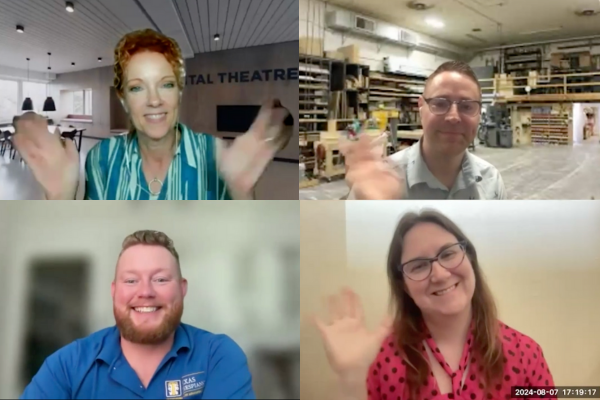4 September 2024
Professional Development with DT+: Technical Theatre Essentials
Elise Czyzowska
Senior Content Marketing Executive
Over the summer, we hosted our very first Professional Development training course all about the world of technical theatre. Led by Head of Schools, Alesha Tatum-Howe, each session covered a different area, from costume and make-up to lighting and props.
Across the four hours of learning, Alesha was joined by former tech director and Texas Thespians' Director of Operations, BK Goodman, and educator and technical theatre extraordinaire, Aileen Zeigler.
To celebrate our attendees reaching the end of their course, we hosted a live wrap-up session, where the trio was joined by Technical Theatre Director John Davenport (Lebanon Trail High School, Texas).
In today's blog, we recap some top takeaways from this session. Keep reading to learn more - or sign up to access the full course on-demand!
"Prove it to me"
To open the session, Alesha asked the panel, "How do you guide students to extract essential information from a script, while still allowing them the freedom to make interpretive choices?".
Aileen explained her process - which, she added, was not far off from the 'Yes, And' rule-of-thumb used in improvisation and acting training.
"It's about asking questions, and being willing to hear ideas", she added. When a student brings you a suggestion, you ask them to prove it; to explain why they think this is a good idea, and how they think it will work.
BK and John agreed with Aileen, with John adding an all-important disclaimer that, of course, "the choices your kids make are not always going to be what you want to do".
"You have to let them do it", he continued. "Try to understand why they want to do it a certain way - but let them make mistakes."

Top (L-R): Alesha Tatum-Howe, John Davenport | Bottom (L-R): BK Goodman, Aileen Zeiger
Character vs. Student
The topic of costume and make-up (Sessions 4-5) then led the group into an insightful discussion of how teachers can have proactive conversations with students about identity and self-image.
Here, BK told a story about a production of Eurydice, where students dressed in full black bodysuits:
"It's all about making sure that every student feels comfortable in the character they're portraying. That can mean talking with them about the concept behind the clothing - for example, for a period play, or why certain colors have been chosen. But it should also include talking through what feels uncomfortable about the costume - and how it could be adjusted to empower the student.
"In Eurydice, for example, some of the students felt uncomfortable with the black bodysuits, so we ended up adding some strips of fabric draped across them. All of a sudden, their movements and their gestures were inhabited by the material we added.
"Because they were comfortable, it took their performance to the next level."
Creating a culture of consent, Aileen added, should start from the very first day of rehearsal. If that culture is present, it's going to carry through to the way we work with costumes.
%20in%20Great%20Expectations%20%7C%20Beckman%20Unicorn%20%7C%20%C2%A9%20Jaap%20Buitendijk.png?width=600&height=400&name=Paula%20Wilcox%20(Miss%20Havisham)%20in%20Great%20Expectations%20%7C%20Beckman%20Unicorn%20%7C%20%C2%A9%20Jaap%20Buitendijk.png)
Paula Wilcox (Miss Havisham) in Great Expectations | Beckman Unicorn | © Jaap Buitendijk
Balancing Technical Theatre with... Everything Else
The final attendee question that the panel tackled was one that they could all relate to: How do you balance technical theatre with being the director, the teacher, and everything in between?
Across the group, the resounding answer was preparation and goal-setting:
"You have to be clear about what your priorities are", Aileen began, "because a show is never finished. You need to accept that there's always going to be more you could do".
For BK, he keeps track of deadlines and goals through weekly lists. Similar to Aileen, he stressed the importance of being kind to yourself when you don't get everything done:
"Anything I didn't complete during the day, I simply move to the next list!", he explained, stressing the importance of these weekly lists in allowing you to involve your students in the planning process. Once they can see the work that goes into a production, they can start to support in this area.
And rounding out the session, John shared his own experience of balancing priorities. Looking back at the last few productions he had staged, he saw a common theme: the final week before opening night was always extremely stressful.
So what did John do?
"I gave myself an extra week."
Yes, it means working an additional week - and yes, it didn't immediately solve every problem. But for John, and doubtless for many others in the same position, it gave him the space to breathe, and to find the enjoyment in what he - and his students - were working on.
You can sign up for the Technical Theatre Essentials Professional Development course to access all four hours of free training, tips, and tools on-demand today.
Related blogs
Theatre Glossary: 70+ Simple Definitions Everyone Should Know
What's the difference between a 'dress rehearsal' and a 'technical rehearsal'? Who is in charge of...
Read more3 Ways Short Form Videos Can Help Energize Your Classroom
The average length of a video on TikTok is between 15-60 seconds, which is a far cry from the 70+...
Read moreTheatre & Performance: top 5 blog posts of 2022
Featuring leading scholars and theatre-makers including Anne Bogart and Katie Mitchell, discover a...
Read moreGet the latest teaching tips straight to your inbox
Explore free lesson ideas and inspiration, education news, teaching trends and much more by signing up to regular blog updates!





